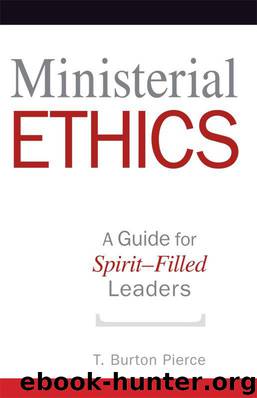Ministerial Ethics: A Guide for Spirit-Filled Leaders by T. Burton Pierce

Author:T. Burton Pierce [Pierce, T. Burton]
Language: eng
Format: epub
Tags: [h]
Publisher: BookMasters
Published: 2012-01-29T17:00:00+00:00
Chapter 10
The Minister and Money: Filthy Lucre in Clean Hands
The minister must maintain a right attitude toward money. Money is to be respected but not loved, appreciated but not coveted. A wrong perspective on financial matters has been the undoing of men and women of God on more than one occasion. It has been said jokingly that money isn’t everything—it just buys everything! Fortunately, the most important things in life are not for sale at any price. Nonetheless, the proper handling of dollars and cents becomes a critical matter to that person who views money too seriously or too lightly, as the case may be.
In reality, the wise handling of money leads to financial security much more readily than greater earning power. Often when income rises, we unwittingly raise our standard of living to the extent that financial pressure actually destroys the joy of living. Regardless of the level of income, we need to hold a conservative philosophy of spending and saving that will result in a reasonably comfortable lifestyle, both now and in later years.
A few years ago in working with ministers and their spouses in estate planning, I noticed an interesting phenomenon. Older couples who had accumulated relatively sizable estates over time had never been blessed in their lifetimes with good, substantial incomes. Their secret was simply careful money handling, in some cases accompanied by frugal living. By contrast, any number of families within the same denominational fellowship, having enjoyed considerably higher levels of income for years, were not prepared for the future, which tends to be marred by burdensome medical expenses or reduced family income, perhaps both. For the head of the home to jeopardize the entire family by carelessly using the resources God has provided is a serious matter.
Recognition of the fact that God is the ultimate source of all financial blessing leads us to a serious consideration of the tithing principle as it applies to the church, the minister, and the minister’s family. The term “principle” becomes appropriate here with the realization that tithing was instituted in the Book of Genesis as a response to blessing and was reiterated by Christ himself in the New Testament. Abraham, “Father of the Faithful,” was the first to return the tithe to God, via Melchizedek, as an act of gratitude for divine assistance when he was rescuing Lot, along with the spoils of war, from his pagan captors (Gen. 14:20). In similar fashion, Jacob made and kept a lifelong vow to the Almighty that he would voluntarily pay tithes of all that God would ever bless him with (Gen. 28:20–22). In neither case did it appear that giving the tithe was a moral obligation but was rather the reflection of gratitude to a gracious God in an era noted for its ingratitude and self-centered actions, even among those called of God.
Jesus made it clear that not only is it ethically sound to practice tithing but it is practical. He admonished the Pharisees to continue to tithe even as
Download
This site does not store any files on its server. We only index and link to content provided by other sites. Please contact the content providers to delete copyright contents if any and email us, we'll remove relevant links or contents immediately.
| Anglican | Baptist |
| Book of Common Prayer | Calvinist |
| Episcopalian | Inspirational |
| Lutheran | Methodist |
| Pentecostal & Charismatic | Presbyterian |
| Quaker | Seventh-Day Adventist |
| Shaker | Theology |
Angels by Billy Graham(1926)
How To Be Born Again by Billy Graham(1781)
Peace with God by Billy Graham(1689)
Unbroken Curses by Rebecca Brown & Daniel Yoder(1575)
God's Prophetic Symbolism in Everyday Life by Adam Thompson & Adrian Beale(1497)
The School of Biblical Evangelism by Ray Comfort(1438)
Call by Rick Joyner(1430)
Martin Luther: The Man Who Rediscovered God and Changed the World by Eric Metaxas(1399)
Power over the Enemy by John Osteen & Joel Osteen(1354)
Jonathan Edwards: A Life by Marsden George M(1236)
Fresh Wind, Fresh Fire by Jim Cymbala(1234)
Prayers That Bring Healing and Activate Blessings: Experience the Protection, Power, and Favor of God by John Eckhardt(1222)
Liturgy of the Ordinary by Tish Harrison Warren(1220)
The Supernatural Power of a Transformed Mind Expanded Edition: Access to a Life of Miracles by Bill Johnson(1207)
Unmasking the Devil: Strategies to Defeat Eternity's Greatest Enemy by John Ramirez(1206)
An Altar in the World by Barbara Brown Taylor(1195)
Reformation Theology by Littlejohn Bradford(1187)
Seeing the Voice of God: What God Is Telling You through Dreams and Visions by Smith Laura Harris(1142)
Martin Luther by Mansch Larry D.; Peters Curtis H.;(1133)
